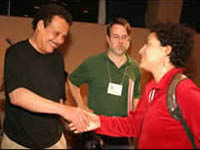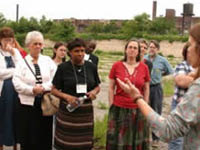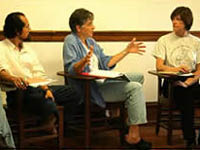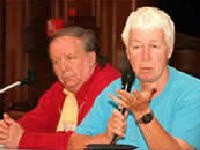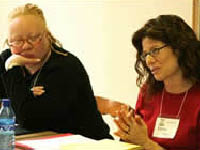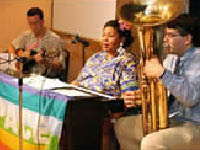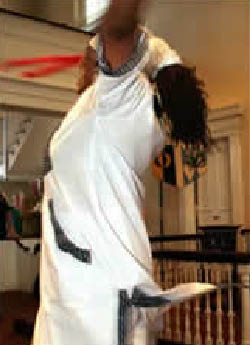2003 PHILADELPHIA
The third Word & World School was our largest to date, with some 140 participants from as far away as Australia and as close as the neighborhood. Faith based activists came from a variety of movements: disarmament, immigrant rights, economic justice, antiracism, globalization from below, prison justice, labor, and more. The School was hosted by Chestnut Hill College in north Philadelphia. Several of the staff of this Catholic co-ed school participated in our classes and their Spirituality Institute co-sponsored our public events. The fact that we were located in an affluent area reminded us of the issues of class, race and power in this still divided city, and of the dangers of trying to live radically in the heart of the empire. Indeed one could look down on the city from the hill and weep, like Jesus over Jerusalem, at the disparity between rich and poor, making us more determined to organize for justice and peace.
PENTECOST
The School took place during the celebration of Pentecost, the traditional feast of the “birth” of the church in the Spirit. This theme was evident throughout the week, culminating in a march through downtown Philadelphia where participants gathered at symbolic sites of oppression and chanted “Catch the Spirit!” as Shane Claiborne breathed plumes of fire into the night sky.
REV. MARTIN LUTHER KING, JR.
The theme text of the School was “Beyond Vietnam: A Time to Break Silence,” by Rev. Martin Luther King, a speech delivered April 4th, 1967 at a meeting of Clergy and Laity Concerned at Riverside Church in New York City. We referenced this text throughout the week, reflecting on King’s historic challenge to build a unified movement against racism, poverty and militarism—and its disturbingly contemporary ring. [Excerpts from this speech appear throughout this report.]
PENTECOST
The School took place during the celebration of Pentecost, the traditional feast of the “birth” of the church in the Spirit. This theme was evident throughout the week, culminating in a march through downtown Philadelphia where participants gathered at symbolic sites of oppression and chanted “Catch the Spirit!” as Shane Claiborne breathed plumes of fire into the night sky.
REV. MARTIN LUTHER KING, JR.
The theme text of the School was “Beyond Vietnam: A Time to Break Silence,” by Rev. Martin Luther King, a speech delivered April 4th, 1967 at a meeting of Clergy and Laity Concerned at Riverside Church in New York City. We referenced this text throughout the week, reflecting on King’s historic challenge to build a unified movement against racism, poverty and militarism—and its disturbingly contemporary ring. [Excerpts from this speech appear throughout this report.]
“We as a nation must undergo a radical revolution of values. We must rapidly begin the shift from a ‘thing-oriented’ society to a ‘person-oriented’ society. When machines and computers, profit motives and property rights are considered more important than people, the giant triplets of racism, materialism, and militarism are incapable of being conquered. |
Components:
- Philadelphia Courses, Faculty and Rountables
- Philadelphia Site Visits and Plenary Sessions
- Worship and Prayer
- Music, Poetry and Celebration
PHILADELPHIA COURSES, FACULTY AND ROUNDTABLES
Following is a list of the Tucson Word and World faculty and classes offered:
Morning Bible Studies
Morning Bible Studies
Music and Drama: Intuitive Roads into Scripture: Ange Smith and Charlie King
The Economy of God: Biblical Economics and Our World: Will O ’Brien and Hilda Campbell
Woman, Great is Your Faith!: Ruby Sales and Joyce Hollyday
Acts: Gospel of the Beloved Community: Bill Wylie Kellermann and Nelson Johnson
A Spirituality of Recovery and Resistance: Margaret McKenna and members of the New Jerusalem Now community
A Call to Faithfulness: The Church in the City: Andre Johnson and John Hirt
Women’s Wisdom in Trying Times: Elizabeth McAlister and Kate Berrigan
The Church as Movement 101: Core Biblical Narratives: Kazi Joshua and Shane Claiborne
Paul as a Builder of Alternative Communities: Kathy Grieb and Michelle Brix
Jesus in the Desert: Vision Quest as Nonviolent Test: Jim Perkinson and Rose Berger
Jesus as Nonviolent Activist: Gospel Reflections: Ched Myers and Isaac Miller
Violence and Nonviolence in Biblical and Later Jewish Traditions: Arthur Waskow and Monica Medina
Afternoon Courses:
There is a River: Streams of Radical Biblical Tradition: Facilitated by Bill Wylie Kellermann with various presenters
Movement History as Biography: Listening to the lives of Elizabeth McAlister, Bayard Rustin, Tony Henry, Ruby Sales, & Richard and Phyllis Taylor: Facilitated by Ched Myers
Introduction to Social Analysis: Understanding the Moment: Kazi Joshua, Katie Day, and Amy Dalton
Resisting War, Proclaiming the Gospel: The Nonviolent Tradition of the “Catholic Left”: Jackie Allen-Doucot and Art Laffin with other members of the Atlantic Life Community
Restorative Justice: The Personal and Political Character of Reconciliation: Facilitated by Elaine Enns with various presenters
Towards Economic Justice at Home and Beyond: Tools for Critical and Creative Economic Thinking: Barry Shelly and Janet Wolf
Martin Luther King, Prophet of Nonviolent Revolution: Nelson Johnson
Building Up a New Nonviolent and Just World: Ruby Sales and Dee Dee Risher
Tremors of the Spirit: Art and Social Transformation: Jim Perkinson and local presenters
Movements of the Spirit: Local and Global Struggles For Justice: Lee Cormie and Isaac Miller
Building a New Poor People’s Campaign for Justice: Willie Baptist and Ed Loring
Life Together: Alternative Communities as Response to Violence: Murphy Davis and Jennine Miller
“Some of us who have already begun to break the silence of the night have found that the calling to speak is often a vocation of agony, but we must speak. …A nation that continues year after year to spend more money on military defense than on programs of social uplift is approaching spiritual death.” |
PHILADELPHIA SITE VISITS AND PLENARY SESSIONS
Sunday was local exposure day. It began with a general orientation to and history of the region. Steering Committee member Ched Myers introduced the King speech, an amazing piece of American public oratory that provides an integral and still relevant analysis. Local organizer Amy Dalton then offered an overview of the political economy of race and class in post-industrial Philadelphia. Ed Nakawatese of the American Friends Service Committee then gave a brilliant thumbnail history of social change in the region, from the Quaker experiment of William Penn to contemporary labor and welfare rights movements.
FROM THE SANCTUARY...
Church of the Advocate
We traveled across town to worship at the historic Church of the Advocate, a venerable Episcopal church located on 18th St and Diamond Avenue in the heart of black Philadelphia. On this Pentecost Sunday we celebrated the Spirit and marveled at the beautiful art work adorning the sanctuary, which tells stories of African American resistance, struggle and triumph. After service and over lunch the pastor, Rev. Isaac Miller, related the history of this parish under the leadership of the late Rev. Paul Washington—a place where Black Nationalists could hold conferences, where Black Panthers could seek refuge from police harassment, and where the first women in the Episcopal Church were “irregularly” ordained in 1974.
FROM THE SANCTUARY...
Church of the Advocate
We traveled across town to worship at the historic Church of the Advocate, a venerable Episcopal church located on 18th St and Diamond Avenue in the heart of black Philadelphia. On this Pentecost Sunday we celebrated the Spirit and marveled at the beautiful art work adorning the sanctuary, which tells stories of African American resistance, struggle and triumph. After service and over lunch the pastor, Rev. Isaac Miller, related the history of this parish under the leadership of the late Rev. Paul Washington—a place where Black Nationalists could hold conferences, where Black Panthers could seek refuge from police harassment, and where the first women in the Episcopal Church were “irregularly” ordained in 1974.
“ Surely this is the first time in our nation’s history that a significant number of its religious leaders have chosen to move beyond the prophesying of smooth patriotism to the high grounds of a firm dissent based upon the mandates of conscience and the reading of history.” |
...TO THE STREETS
Three exposure tours attempted to give local contextualization to King’s “giant triplets” of militarism, racism, and poverty:
"Reality Tour"
A “reality tour” of local urban poverty—originally designed by the Kensington Welfare Rights Union (KWRU)—was led by members of the simple way (a local intentional Christian community). It visited several neighborhoods devastated by welfare economics, lack of health care and the criminalization of poverty, and noted the sharp contrast between this systematic underdevelopment and the millions of dollars of investment capital flowing into center city to attract tourism. The tour also chronicled ways in which marginalized folk survive these difficult circumstances, engage in creative acts of resistance and humanize tough conditions through art and gardening.
Nonviolence at the Waterfront
A trip to the waterfront looked at militarism and the rich legacy of resistance to it. Standing in front of the rusting hulk of the former luxury cruise ship named “United States of America”—a fitting metaphorical backdrop—we heard stories of nonviolent canoes blocking warships during the Vietnam war, and of coordinated longshoreman strikes that held up arms shipments during the Bangladesh war of independence in 1971.
Racial Oppression: Eastern Penitiary, Girard College and White Flight
A third tour focused on issues of race, looking at several sites representing ways that urban institutions contribute to racial oppression. The preserved site of Eastern State Penitentiary was the first mass incarceration unit built in the country, and profoundly influenced the subsequent prison industry. Next was Girard College, a school for orphan boys built in the 19th century and desegregated in the mid-20th. This was followed by a visit to two sites in west Philadelphia where the postindustrial forces of white flight, urban blight, redlining, and re-gentrification are visibly evident, and a debriefing at a neighborhood Baptist church.
“I knew that America would never invest the necessary funds or energies in rehabilitation of its poor so long as adventures like Vietnam continued to draw men and skills and money like some demonic destructive suction tube. So I was increasingly compelled to see the war as an enemy of the poor and to attack it as such.” |
Four times during the week morning plenary panels focused on the stories of particular struggles, which the School then uses as a lens through which to view the wider issues. Each plenary began with a five-minute recording of King’s Riverside speech; participants were transfixed hearing this prophet’s voice, whose words still thrill and sting.
Monday: "Plowshares" Movement
We heard from participants in the “Plowshares” movement of nonviolent resistance to nuclear weapons. School elder Elizabeth McAlister, as well as Elmer Maas, Art Laffin and Bob Smith told the story of the 1980 Plowshares action at King of Prussia, in which Mark 12-A warheads were hammered upon in the spirit of Isaiah’s prophecy: “And God shall judge among the nations, and shall rebuke many people, and they shall beat their swords into plowshares… nation shall not lift up sword against nation, neither shall they learn war any more” (Is 2:4). Respondents Sachio Koyen and Jorge Aruaz reflected on the continuing relevance of such direct actions, and probed questions of “prophetic faithfulness vs. political effectiveness” in organizing.
Tuesday: Church of the Advocate and the Black Panther Movement
We focused on the story of the Church of the Advocate’s relationship with the Black Panther movement. Pastors Isaac Miller and Ann Robb Smith and several long-time church members recalled the early 1970s as a time of racial tension and conflict with Mayor Rizzo, and the struggle of church members to welcome radical activists into the sanctuary, sometimes at great risk. Dialogue followed concerning current possibilities and challenges for cross-racial solidarity in Philadelphia and beyond.
Thursday: The "Takeover" of St. Edward's Catholic Church by the Homeless
We heard from Kensington Welfare Rights Union activists Brooke Sexton, Tara Colon and Mariluz Gonzalez, who told the story of the “takeover” of St. Edward’s Catholic church by homeless persons in 1995 and how that action fit into a broader history of poor people’s struggles. They also spoke of other KWRU campaigns, including a current initiative to revive and complete Dr. King ’s Poor People’s March on Washington.
Friday: Sustenance
In Friday’s final plenary session Sheldon Lucas of New Jerusalem (a recovery community), Ed Loring of the Open Door Community (a ministry with homeless people) and labor leader Deborah Compton Holt spoke of what gives them sustenance. Other School participants then offered testimonies about how they are able to maintain hope in their organizing work despite formidable opposition in today’s hard-hearted society.
WORSHIP AND PRAYER
Our days began with prayer in a variety of traditions (Catholic, Quaker, Baptist and Taize), and were regularly punctuated with extraordinary times of communal worship. Spiritual guides and elders were available to talk with people as the week unfolded, and healers were busy with bodywork. Small Groups met several times during the week, providing spaces for intimate sharing, debriefing and reflection on class and plenary content.
Wednesday, the School re-gathered downtown at Old First Reformed Church for our public worship service. After a rousing Pentecostal processional the W&W choir sang under the direction of Valerie Lee-Jeter. We heard sermons from Rev. Ruby Sales of Spirit House, Jim Wallis of Sojourners, and Rev. Nelson Johnson of the Beloved Community Center, and then had the traditional passing of the “torch” from representatives of the original Detroit consultation to the Greensboro, Tucson and Philadelphia Schools. And of course Ange Smith reprized her memorable performance of “His Eye is on the Sparrow.”
The worship service was followed by a candlelight procession through downtown, passing by the federal courthouse, the Liberty Bell, the federal prison and the new Constitution Center as a away of highlighting the contradictions of freedom and oppression that characterize the city and the nation. At each place meditations and prayers were offered, followed by a refrain of Pentecostal fire-blowing by simple way activist Shane Clairborne.
Wednesday, the School re-gathered downtown at Old First Reformed Church for our public worship service. After a rousing Pentecostal processional the W&W choir sang under the direction of Valerie Lee-Jeter. We heard sermons from Rev. Ruby Sales of Spirit House, Jim Wallis of Sojourners, and Rev. Nelson Johnson of the Beloved Community Center, and then had the traditional passing of the “torch” from representatives of the original Detroit consultation to the Greensboro, Tucson and Philadelphia Schools. And of course Ange Smith reprized her memorable performance of “His Eye is on the Sparrow.”
The worship service was followed by a candlelight procession through downtown, passing by the federal courthouse, the Liberty Bell, the federal prison and the new Constitution Center as a away of highlighting the contradictions of freedom and oppression that characterize the city and the nation. At each place meditations and prayers were offered, followed by a refrain of Pentecostal fire-blowing by simple way activist Shane Clairborne.
“We were taking the black young men who had been crippled by our society and sending them eight thousand miles away to guarantee liberties in Southeast Asia which they had not found in southwest Georgia and East Harlem. So we have been repeatedly faced with the cruel irony of watching Negro and white boys on TV screens as they kill and die together for a nation that has been unable to seat them together in the same schools. So we watch them in brutal solidarity burning the huts of a poor village, but we realize that they would never live on the same block in Detroit. I could not be silent in the face of such cruel manipulation of the poor.” |
MUSIC, POETRY AND CELEBRATION
Around the campfire there was spontaneous poetry, music, story telling, jokes and low-key conversation.
Friday night brought a celebratory conclusion to the week with public performances by School diva Angie Smith (who drafted guitarist Mike Boucher and tuba player Kristian Johnson into a jazz trio, veteran movement songster Charlie King, the “Plowshares Choir,” and several village poets (Sheila Kingsbury-Burt, Jim Perkinson, Rose Berger) and dancers (Jacqueline Jones).
An excellent “Village Marketplace” was organized so that participants could sell their wares, and the space was colorfully filled with, not only books, t-shirts and crafts, but also with a stunning installation of photographs of local struggles by Philly photographer Harvey Finkle.
“A true revolution of values will soon cause us to question the fairness and justice of many of our past and present policies… The Western arrogance of feeling that it has everything to teach others and nothing to learn from them is not just. A true revolution of values will lay hands on the world order and say of war: ‘This way of settling differences is not just.’” |

